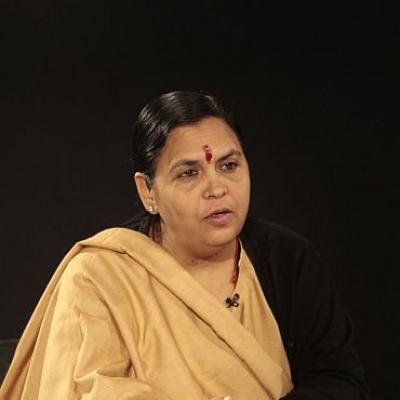 'We expect mobs on the subcontinent to hand out punishment without trial.'
'We expect mobs on the subcontinent to hand out punishment without trial.'
'To have ministers doing it and then being proud about it says something about how the law is treated in India and how seriously ministers take their oath of office,' says Aakar Patel.
All ministers and prime ministers who take office in India make this promise: 'I do swear in the name of God that I will bear true faith and allegiance to the Constitution of India as by law established, that I will uphold the sovereignty and integrity of India, that I will faithfully and conscientiously discharge my duties... and that I will do right to all manner of people in accordance with the Constitution and the law without fear or favour, affection or ill will.'
This oath is taken from the Constitution's Third Schedule.
There is also an oath of secrecy that the minister 'will not directly or indirectly communicate or reveal to any person or persons any matter which shall be brought under my consideration or shall become known to me except as may be required for the due discharge of my duties as such Minister.'
How seriously do our ministers and leaders take this promise to be faithful the Constitution, which means essentially to uphold the law?
Last week, BBC reported this news: 'An Indian minister says she made rape suspects beg for their lives and ordered police to torture them.'
Uma Bharti, India's water resources minister, claims she told the men's accusers to watch as they were hung upside down.
'Rapists should be tortured in front of victims until they beg for forgiveness,' she said. 'The rapists should be hung upside down and beaten till their skin comes off,' the minister is reported to have said.
'Salt and chilli should be rubbed on their wounds until they scream. Mothers and sisters should watch so they can get closure.'
What the minister is claiming to have done is essentially a criminal act.
The law and the Constitution do not allow for what Bharti did, because the process for handling crimes is clear.
The police register a case and investigate, the State prosecutes and the judiciary decides.
What Bharti is boasting she did is violating the Constitution and law she swore to uphold.
We expect mobs on the subcontinent to hand out punishment without trial. To have ministers doing it and then being proud about it says something about how the law is treated in India and how seriously ministers take their oath of office.
The other thing is that these boasts about punishment to rapists should be contrasted with India's actual record of action on that crime.
None of the seven survivors of gang rape in the Muzaffarnagar riots of 2013 who filed FIRs have got justice yet.
One of the women has died while the other six have been fighting against the system to be heard.
The women have been threatened by their alleged rapists and have received no support from those who are advertising their great actions against sexual violence.
A massive movement was launched in India after the incident in Delhi known as the Nirbhaya case in which a young woman was sexually assaulted and murdered.
After it, changes in law and in procedure were made to ensure that victims and survivors of such violence received speedy justice.
The reality is that there is no change on the ground, as the Muzaffarnagar gangrape cases show.
And so on one hand we have total failure from the State on its actual performance and delivery on sexual violence and rapists.
And on the other hand we have these statements about what fabulous things ministers have done to address these crimes.
The unusual thing about what Bharti said is this. She will likely not even be aware that she is violating the Constitution, because she is convinced she is doing the right thing.
And the right thing, in the perspective of people like her, is not necessarily the legal thing. She swore 'that I will do right to all manner of people.'
But the distinction between an accused and a convict does not really exist in a society which believes that there are people who come from 'good families'.
Those who do not come from good families must possibly be bad by birth and should be punished for that.
The civilised idea of law is that it grants protection to the accused and that is why we have the phrase 'presumed innocent until found guilty.' But that goes against the primitive thinking exhibited by our minister.
All the focus in that oath is on that line about 'unity and integrity of India.' That is sacred and those who are accused of violating that sentiment, even verbally, will be thrashed, again without trial.
The rest of it, the bearing of faith and allegiance to the Constitution of India as by law established, is incidental.
Aakar Patel is Executive Director, Amnesty International India. The views expressed here are his own.
- You can read Aakar's earlier columns here.










 © 2025
© 2025